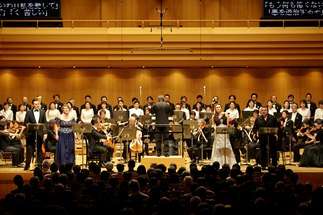|
Back
An Inspired Kashchey the Deathless Tokyo
Concert Hall, Tokyo Opera City
10/09/2015 -
Nikolai Rimsky-Korsakov: Kashchey the Deathless
Mikhail Gubsky (Kashchey the Deathless), Ksenia Vyaznikova (Kascheyevna), Anastasia Moskvina (Princess Tsarevna), Boris Dyakov (Prince Ivan-Korolevich), Hiroaki Otsuka Tthe Storm-Knight)
New National Theatre Chorus, Kyohei Tomihira (Chorus Master), Tokyo Philharmonic Orchestra, Mikhail Pletnev (Conductor)

(© Tatafumi Ueno)
On October 9 Mikhail Pletnev conducted the Tokyo Philharmonic Orchestra (TPO) at Tokyo Opera City in an impressive concert version of Rimsky-Korsakov’s Kashchey the Deathless. This rarely performed opera (even in Russia) of about 70 minutes in three tableaux is performed without a break and was premiered in Moscow in December, 1902.
All four of the imported singers–from the Russian National Orchestra Grand Festival–were first class, and two, soprano Anastasia Moskvina as Princess Tsarevna and baritone Boris Dyahov as Prince Ivan-Korolevich, were sensational. Moskvina’s voice was not only strong and hearty but at the same time clear and radiant. Her highest notes were spine-tingling–almost too loud for comfort. She recalled for me Elizabeth Schwarzkopf. Her warmly repeated lamenting motif (echoed throughout by mezzo-soprano Ksenia Vyazikova as Kascheyevna) ran like a thread of longing and hope through the work.
Dyakov exhibited the richest, most sonorous voice imaginable–a worthy successor to Dimitri Hvorostovsky. His duet with Vyaznikova (“Pit’yo prokhladnoe”) was ethereal and riveting. Vyaznikova was as glamorous and powerful as Moskvina and her opening “Nastala noch” was infused with passion and torment that recalled Kundry in Wagner’s Parsifal.
Larger-than-life tenor Mikhail Gubsky played the villain Kashchey. His voice at the beginning (first heard off stage in the opening duet with the Princess) was strained and he tended to shout. Once relaxed, however, he brought visceral power to the role and sang with ease and confidence. The only non-Russian in the cast–Hiroaki Otsuka as the Storm-Knight–didn’t project as well as the other singers but sang a fine conclusion to his role from the centre of the choir loft.
The 60-member mixed choir was well-rehearsed and sang flawlessly during the snowstorm scene at the end of Tableau One, and with passion and sustained power at the opera’s apotheosis.
Pletnev this season is Special Guest Conductor of the TPO. He has been working with the orchestra since 2003, and it was clear that he enjoys a warm rapport with the musicians. With minimal fuss Pletnev brought a tight focus to the performance while releasing the myriad colors of Rimsky-Korsakov’s experimental musical language. The woodwinds shone with meticulous intonation and verve, the strings sang in unison and the brass section was in top shape.
The TPO is the oldest and largest orchestra in Japan. The 150-member ensemble presents over 300 performances a year, including several series of subscription concerts in various venues as well as opera accompaniments. In just this one week alone, apart from the Rimsky-Korsakov performance, I heard them accompany two other operas–Strauss’s Die Liebe der Danae under the baton of Jun Märkl and Das Rheingold under the direction of Taijior Iimori.
An official of the TPO told me afterwards that the orchestra hopes to invite more Russian singers to perform with them in Japan–how I envy the lucky Japanese.
TPO’s website
Earl Arthur Love
|